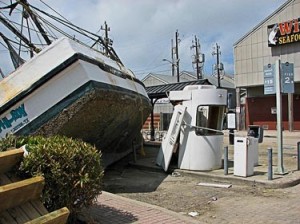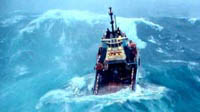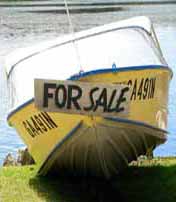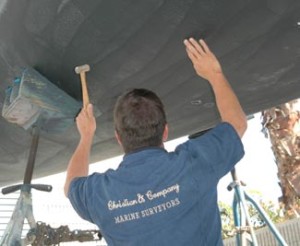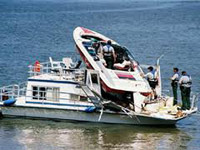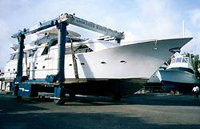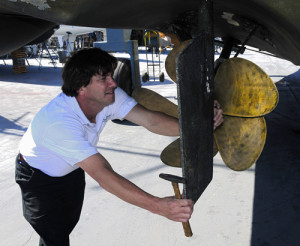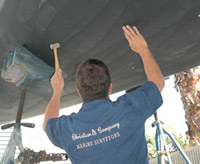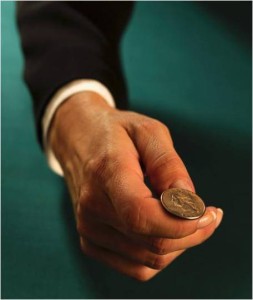As the name of the article implies, we feel that maintaining suitable insurance on your vessel is important. We buy insurance to protect us from unexpected events and there are the obvious reasons to insure your boat and there are lesser known, but important benefits, which we will discuss. Over two decades of assisting marine insurance carriers with damage claims is the perspective from which this article is written and it was inspired by a recent speech at a San Diego area yacht club. The gathering of “seasoned” boaters requested that the undersigned speak about the importance of maintaining suitable boat insurance and how to maintain the boat so it “passes” survey. This is part one of a two part article based on that speech.
Most of the insurance claims which we have handled involve either damage to the boat owned by the insured or financial exposures to the boat owner for liability arising from that ownership. A boat owner can choose to buy liability only insurance, however most boat policies include coverage for both types of losses. Generally, liability only insurance is purchased if the vessel itself can be lost without significant financial harm to the owner, but he or she chooses or is required to provide liability protection for themselves or a marina. This option protects assets other than the boat. Liability only insurance, is usually purchased to save money, as it costs less than a policy offering full coverage. Liability insurance does not offer coverage for damage to your boat.
Damage to your vessel, covered under your policy of insurance is referred to as a first party claim. The handling of the claim including the coverage decisions, adjustment and payments are governed by the insurance policy. The policy is a contract between the insured and the insurance carrier and it stipulates what is covered, what is excluded, what is depreciated and other important details. On the declarations page of the policy you will find your limits of coverage, deductibles and the various components of the policy, which will include vessel value limitation and liability exposure limitations.
Typical first party claims involve submersions or partial submersions, collisions or an allision *, fires, smoke and machinery failure. The basic purpose for property damage coverage in your boat insurance claim is to minimize your financial exposure due to an unexpected, accidental loss to your boat. Many policies also use language such as “sudden” and “fortuitous”, with the idea that gradual wear and tear, deterioration and normal maintenance are not covered.
In the second part of this article we will discuss the most common causes of the typical claims and how to maintain a vessel to prevent them. The underlying idea that the claims are “unexpected” is the most important motivation for maintaining first party coverage. While most of the boat owners with whom we interface while handling claims did not anticipate the loss, many times there are clues which foreshadowed the loss. Being aware of a subtle, small change in the condition of the vessel will often prevent a significant loss by breaking the chain of unfortunate circumstances which often precede a significant damage claim.
Submersions often occur due to the failure of a bilge pump, or so we are told by boat owners. In every submersion claim we have ever handled, the basic cause of the loss is always the same. While the bilge pump failure may have contributed, the true cause of the submersion is always “too much water on the inside”. Boats, even wooden boats, should keep the water on the outside. If you find water accumulating in the bilge, or the bilge pump is cycling, determine the source of the leak immediately.
Similarly address any change in the condition or function of the boat and its systems when they are first noticed. If the circuit breaker trips, determine the cause and address it appropriately. If your engine has always been reliable and starts on the first turn, but today cranks for several seconds before starting. Don’t ignore the clues your boat is trying to give you. We have noticed that recreational boats’ engines rarely wear out; the failures are usually the result of a component failure that goes unchecked. Conversely commercial boat’s engines hiccup and the captain notices and addresses the issue, leading to much longer service lives than recreational boats’ engines.
Machinery failure is a component of boat insurance policy that is often misunderstood. Some policies exclude machinery failure. Most policies provide coverage for machinery failure, but all policies limit coverage based on the cause of loss. We see engine failures covered by boat insurance policies regularly. Maintain the vessel and the engine; pay attention to clues to prevent catastrophic failure but don’t overlook possible assistance from your insurance policy if a catastrophe occurs.
A boat owner’s nephew was taking the boat out on a summer holiday. After a short time, he noticed a change in the engine. The change was small and included a different noise and a change in the exhaust smoke. He slowed the engines, turned them off and discussed the situation with the other passengers. Nobody aboard was an experienced, seasoned mariner. They decided to restart the engines, without checking the engine room or determining the cause of the change. Everything appeared normal and they continued on their holiday excursion. A short time later the cabin was filled with smoke and the voyage was aborted as the operator and passengers were rescued and the vessel was attended by the fire department and towed to a boat yard.
The inspection revealed that there was a fire in the engine room. The fire was initiated by the failure of an exhaust hose. The exhaust hose failed due to cooling water blockage in the engines exhaust mixing elbow. The blockage in the mixing elbow was caused by corrosion and is a common failure mode.
The good news was the passengers were rescued and uninjured. The fixed fire extinguisher in the engine room functioned properly and the vessel was not a total loss. The bad news was the claim was denied and preventable. Had the operator checked the engine after the first indication of a problem, he would have likely been alerted to the impending failure of the exhaust system and could have discontinued using the vessel until proper repairs were made.
Fire damage claims do not always arise due to causes that are aboard the insured vessel. Fire claims are a common third party claim. Third party claims are when a claim is made for damage to your property, against an insurance policy for something other than your boat, like another boat, boat yard or marina or when others make a claim on your policy for damage to their property. Just because a fire starts on another vessel and damages your boat, don’t assume that the other boat’s insurance policy will pay for the damage to your vessel. If the cause of the fire is deemed to be negligence on the part of the boat owner, coverage may be extended. However, if the cause is not deemed to be negligence you may have to rely on your own policy to cover the expense for repairing the damage to your vessel. For instance, a fire caused by a cigarette butt thrown onto your neighbor’s vessel is not due to the neighbor’s negligence. Many times, the exact cause of the fire is never definitively determined. This is another reason to assure that your vessel has property damage coverage to protect your investment and your asset. Fires also illustrate the benefits of liability coverage.
The liability portion of your policy covers you from financial exposures which arise due to the ownership, maintenance or operation of your vessel. Most boat owners consider liability protection as defense against law suits such as personal injury claims or damages resulting from collisions from other vessels or structures. These are the normal uses, occasions arise where even the circumstances of these somewhat anticipated situations are surprising and the liability portion of your policy provides additional protection which you may not have considered. A somewhat unique circumstance arose during a sea trial of a vessel which was pending sale. Engine control failure resulted in the vessel colliding with a private dock during the sea trial, with the potential owner aboard. The vessel’s owner was not aboard, but his insurance policy remained in effect. The insurance policy took care of the expense of repairing the private dock and the skilled broker salvaged the transaction, leaving all parties satisfied. This example illustrates why the policy should remain in effect until the ownership is fully and completely transferred and illustrates the benefits of the liability portion of the policy resulting from an unexpected incident.
It is unlikely that any other policy, including your homeowner’s policy, will provide coverage from liability arising from ownership of a vessel. Most homeowner’s policies specifically exclude liability arising from ownership or operation of a watercraft.
If your vessel was to suffer the unfortunate circumstance of a submersion or a partial submersion, the liability portion of your boat insurance policy is where coverage can be found for salvage. Salvers maintain expensive equipment and have highly specialized skills and experience. If their skill and equipment is used to raise your vessel, you will learn how expensive their expertise can be. The salvage expense will likely be borne by your boat insurance carrier. Vessel towing policies generally exclude even simple de-watering operations and virtually never include coverage for salvage operations of any kind.
Many marinas require liability insurance and may require being named as an additional insured on your policy. This requirement may be enforced at your home marina or at a guest dock while cruising. Some policies provide coverage for costs to mitigate pollution, including fuel spills and may even pay the fines which accompany the spill. These are additional benefits from maintaining suitable insurance on your boat.
By far, the best insurance is a knowledgeable boat owner, an active maintenance schedule and an operator who pays attention to subtle clues that the boat gives. As the above examples illustrate, accidents do happen. Insure the vessel, protect the value of the asset and insulate your personal wealth with a suitable boat insurance policy.
* The striking of one ship by another (The Random House Dictionary of the English Language – the unabridged edition)
In addition to maintaining adequate boat insurance, some losses involving a vessel may be covered by other policies. Homeowner’s insurance often covers loss of personal property and is not limited to the loss of that property from the insured residence. For instance, a watch stolen or lost while boating may be covered by a homeowner’s policy. Some types of boating losses will be specifically excluded by many homeowners’ policies, primarily losses involving the boat itself or liability arising from boat ownership. Those who carry umbrella policies should confirm with their agent that their boat insurance policy and limits are appropriate so that the umbrella policy’s coverage will be seamless.
